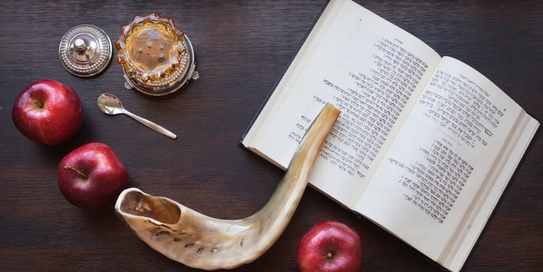IF ANY BAPTISTS are praying for me this week, I should like to express my heartfelt thanks.
On the Jewish calendar, these are the Days of Awe, the most solemn 10 days of the Jewish year. They began last Friday night with Rosh Hashana, the Jewish New Year, and they will end next Monday with Yom Kippur, the Day of Atonement. So strong is the pull of these Days of Awe and their intense focus on repentance and forgiveness, that they draw even lapsed or secular Jews to the synagogue.
Last week, a few days before Rosh Hashana, the International Mission Board of the Southern Baptists issued a prayer guide urging church members to pray for the conversion of the Jews. "Pray for the Messiah to reveal Himself in miraculous ways to the 'lost sheep of the house of Israel,'" it urges. "Pray each day for Jewish individuals you know by name. . . . Build authentic friendships with Jewish people. Love them as you would an unsaved relative."
There is not a harsh or bigoted word anywhere in the booklet. It contains reflections on Jewish customs during the Days of Awe, and suggests specific points on which Baptists can focus while praying. ("Pray that Jews will rediscover the uniqueness of who they are in history." "Pray that Jewish people would be free of the strong influence of materialism in the lands where they live.") And it calls attention to the condition of Jews around the world. ("As Jewish families in Argentina suffer economic crises, pray that Christians will respond in ways that do not provoke shame." "Pray that God will protect the rights of Jews in the Ukraine and Belarus.")
Southern Baptist interest in converting Jews is not a new phenomenon. In 1996, the denomination's annual convention adopted a resolution to "direct our energies and resources toward the proclamation of the Gospel to the Jews."
 The traditional Rosh Hashana liturgy several times implores, "Our God and the God of our fathers, rule the whole world in Your glory." |
It is a widely held article of Christian faith that no one can be spiritually saved except through Jesus, and that Christians are bound to spread this good news -- the literal translation of "gospel" -- to those who haven't accepted it. Judaism teaches differently. No intermediary can deliver God's grace and forgiveness, Jews believe; one must earn His favor directly, through prayer, repentance, and charity. Observant Jews daily recite the 145th Psalm, which offers the assurance that "the Lord is near to all who call on Him, to all who call on Him with sincerity."
As a Jew, I cannot share the Baptists' belief in Jesus. But I can certainly acknowledge that by their lights they are offering the Jewish people something incalculably precious: eternal salvation. My religion does not require me to go out and proselytize (indeed it discourages it). But I have no trouble respecting the dedication of a Southern Baptist whose religion does require it of him.
To listen to some prominent Jews, however, you'd think the Baptists were calling for a pogrom.
"We find this offensive," snaps Mark Briskman of the Anti-Defamation League. "It shows an element of arrogance because they are specifically targeting Jews during this holy season."
Rabbi Eric Yoffie of the Union of American Hebrew Congregations, an organ of Reform Judaism, accuses Southern Baptists of "an absence of awareness that these sorts of statements throughout history are associated with coercion, hatred, and violence." Three years ago, after the Southern Baptists adopted their resolution on conversion, Rabbi Leon Klenicki of the ADL was even more explicit: "Especially after the Holocaust, Christians have no right to talk about a mission to the Jews."
Rubbish. Worse than rubbish. The 250 years that Jews have lived amid American Christians have been an era of peace and prosperity virtually without parallel in Jewish history. To link the Southern Baptists to European anti-Semitism -- never mind to the Holocaust -- is utterly indecent.
It is possible, of course, that some evangelicals will succeed in luring Jews to Christianity. Some already have; so-called "messianic Jews" are converts who were attracted by the promise that accepting Jesus would make them "more fulfilled" Jews. Judaism doesn't work that way, but successful Christian missionaries tend to focus their efforts on Jews who never learned very much about how Judaism does work. That is scandalous -- no, not the conversion, but the ignorance that made the conversion possible.
"Would that Jewish leaders worried as much about the souls of confused young Jews as much as the evangelicals do," says Binyamin Jolkovsky, whose lively Internet magazine, Jewish World Review, actively reaches out to Christians. "If every Jewish child had a solid Jewish education, nobody would be worrying about the Southern Baptists."
No Christians will offend me by praying that I find my way to their Lord during the Days of Awe. It may surprise them to learn that I -- and countless other Jews -- annually return the favor. The traditional Rosh Hashana liturgy several times implores, "Our God and the God of our fathers, rule the whole world in Your glory . . . and let everyone who breathes proclaim: 'The Lord, God of Israel, is king, and His majesty reigns over everything.'"
So let us all pray for each other's spiritual enlightenment. And may each of us, and all who seek the well-being of others, be inscribed in the Book of Life for the year ahead.
(Jeff Jacoby is a columnist for The Boston Globe).
-- ## --
Follow Jeff Jacoby on X (aka Twitter).
Discuss his columns on Facebook.
Want to read more? Sign up for "Arguable," Jeff Jacoby's free weekly email newsletter.

